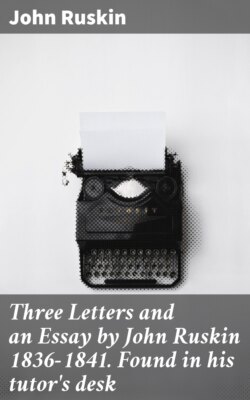Three Letters and an Essay by John Ruskin 1836-1841. Found in his tutor's desk

Реклама. ООО «ЛитРес», ИНН: 7719571260.
Оглавление
John Ruskin. Three Letters and an Essay by John Ruskin 1836-1841. Found in his tutor's desk
Three Letters and an Essay by John Ruskin 1836-1841. Found in his tutor's desk
Table of Contents
EDITOR’S PREFACE
PUBLISHER’S NOTES
ESSAY ON LITERATURE—1836
EARLY LETTERS
Rome, December 31 (1840)
Lausanne, June 9 (1841)
Leamington, Wednesday, Sept. 22 (1841)
WORKS BY JOHN RUSKIN
Отрывок из книги
John Ruskin
Published by Good Press, 2021
.....
“Some little effort was made to pull me together in 1836 by sending me to hear Mr. Dale’s lectures at King’s College, where I explained to Mr. Dale, on meeting him one day in the court of entrance, that porticoes should not be carried on the top of arches; and considered myself exalted because I went in at the same door with boys who had square caps on. The lectures were on early English Literature, of which, though I had never read a word of any before Pope, I thought myself already a much better judge than Mr. Dale. His quotation of ‘Knut the king went sailing by’ stayed with me, and I think that was all I learnt during the summer.”
As the essay is not on early English Literature and has not been annotated or marked by the master, it was not apparently done as work for the course of lectures. It is, in fact, a glowing defence of the writer’s favourite authors, Walter Scott, Bulwer Lytton, and Byron. It begins logically and calmly, but as soon as the defence begins the champion draws his sword and falls fiercely on his opponents. He is a most gloriously enthusiastic partisan; but the religious schools of that day dealt more hardly with the novelists, poets, and playwrights than they do now. In spite of his strong Evangelical bias, Mr. Dale was not among the decriers of fiction and poetry. Walter Scott was a favourite in his household; there are no records of his feelings about Lytton’s work, but Byron was an acknowledged great poet, sullied by the authorship of “Don Juan,” a position the poet still holds in the majority of opinions. As soon as he could read, Mr. Ruskin tells us, Pope’s Homer and the Waverley Novels became his regular week-day books, so his dictum on Sir Walter was the result of a considerable course of study taken by a small boy in his little chair in his own corner. Byron was also an old friend. The poems, including “Don Juan,” were read by the elder Mr. Ruskin to his wife and son. He was a beautiful reader, and did justice to the music of the verse. There are not many who, writing at sixteen, can look back on so long and so cultivated an acquaintance with their favourite authors.
.....